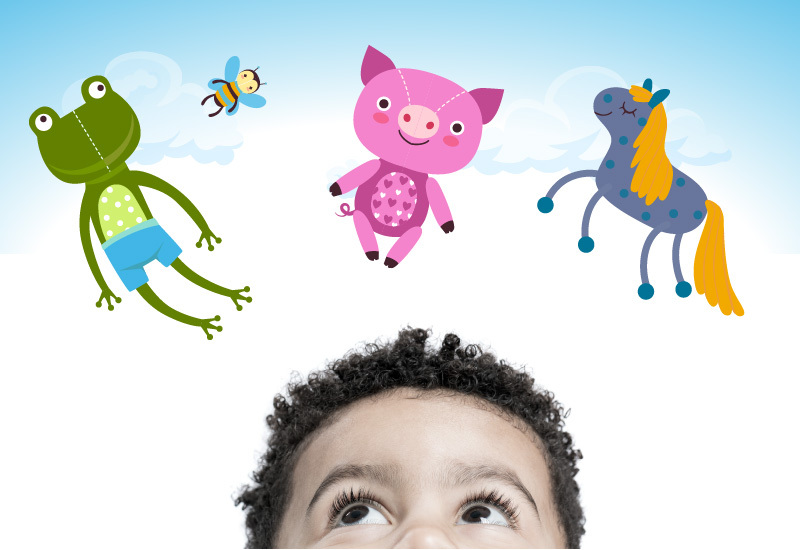Your child’s imaginary friend is more than a good buddy

You can’t hear stuffed toys talking. You can’t see pretend companions coming to life. But your child probably wouldn’t imagine spending a day without them — and that’s perfectly normal behavior. Boston Children’s child psychologist Keneisha Sinclair-McBride, PhD, offers insight on how imaginary “friends” help your child develop emotionally.
Lots of children have imaginary friends
Children usually create imaginary friends or form relationships with puppets and stuffed animals after they turn 2. But it can happen at any age during childhood, Sinclair-McBride says. It’s common behavior.
“To create those kinds of characters, children need to have some skills around imagining different points of view or perspectives. That’s an important cognitive concept,” she says. Not all children have imaginary friends or relationships with toys, so there’s no need to worry if your child doesn’t.
Imaginary play shouldn’t interfere with necessary routines and tasks, she says, but it’s otherwise okay to let your child’s imagination run throughout the day. They will outgrow this stage someday. Enjoy it while it lasts.
They’ve found an always-available friend
An imaginary friend is a pretend companion that listens to your child with an empathy and openness they might not always receive from a human friend, Sinclair-McBride says.
Stuffed animals and puppets, on the other hand, physically stand in for real people and let your child act out themes and situations. A doll or puppet can stand in for a sibling or classmate. Or it can help your child role-play: student to your child’s teacher, or villain to your child’s superhero.
Either way, both types of friends help your child learn how to empathize with others, feel confident about themselves, and be creative. These possibilities are not always available to children in real life.
Imaginary play lets your child control their environment
There are many things a child can’t control: mealtimes, screen time, bedtimes. But imaginary play, Sinclair-McBride says, is something they can own and control. They can be the “boss” of their make-believe friends, and that can be liberating when they usually have to follow guidelines and rules at home and school.
A way to build social skills and manage emotions
Sinclair-McBride says stuffed animals and imaginary buddies can also help your child figure how to accept differences in people and learn how to have thoughtful conversations with those who are not like them.
This type of play can also improve their communication skills. Tea time with a doll, for instance, lets them practice when to speak and listen — and rehearse sharing. Just as importantly, these interactions also allow your child to release emotions and learn the different ways they can express those feelings.
Play-acting drives creativity and brings dreams to life
The many scenarios your child dreams up for their pretend friends only further expand their imagination, Sinclair-McBride says. They pick up details from real life, TV shows, and books and apply what they’ve observed to their play.
That’s why your child’s imaginary friend might live in a faraway place but is only visiting. It’s why their favorite stuffed animal might have been adopted from a make-believe place. Your child wants to be creative, and their imaginary friends help them get inventive.
Support your child’s imagination and play along
Sinclair-McBride recommends that you take interest in your child’s imaginary worlds. Ask questions about their pretend friends and treat them with the same respect your child does. This is important to your child.
Also, don’t hesitate to play along. “It’s magic to them, even if you know it’s pretending,” she says. “Spending time with them and laughing together, that’s magical, too.”
Learn more about the services available to you and your child at the Department of Psychiatry and Behavioral Sciences.
Related Posts :
-

Help kids fight the "Selfie Effect" and build self-esteem instead
It may be hard to imagine now, but there was a time not too long ago when social media didn’...
-

Parents can help end bullying by always being open to conversation
You just saw your teen get pushed at the bus stop. Or maybe you suspect that bullying is behind your ...
-

Four ways to support your teen's mental health
Being a teen is hard enough, but with the current adolescent mental health crisis, parents should know about the psychosocial ...
-

Why families need routines (even in the summer)
They say you don’t know what you have until it’s gone. Maybe no one has realized this more ...





